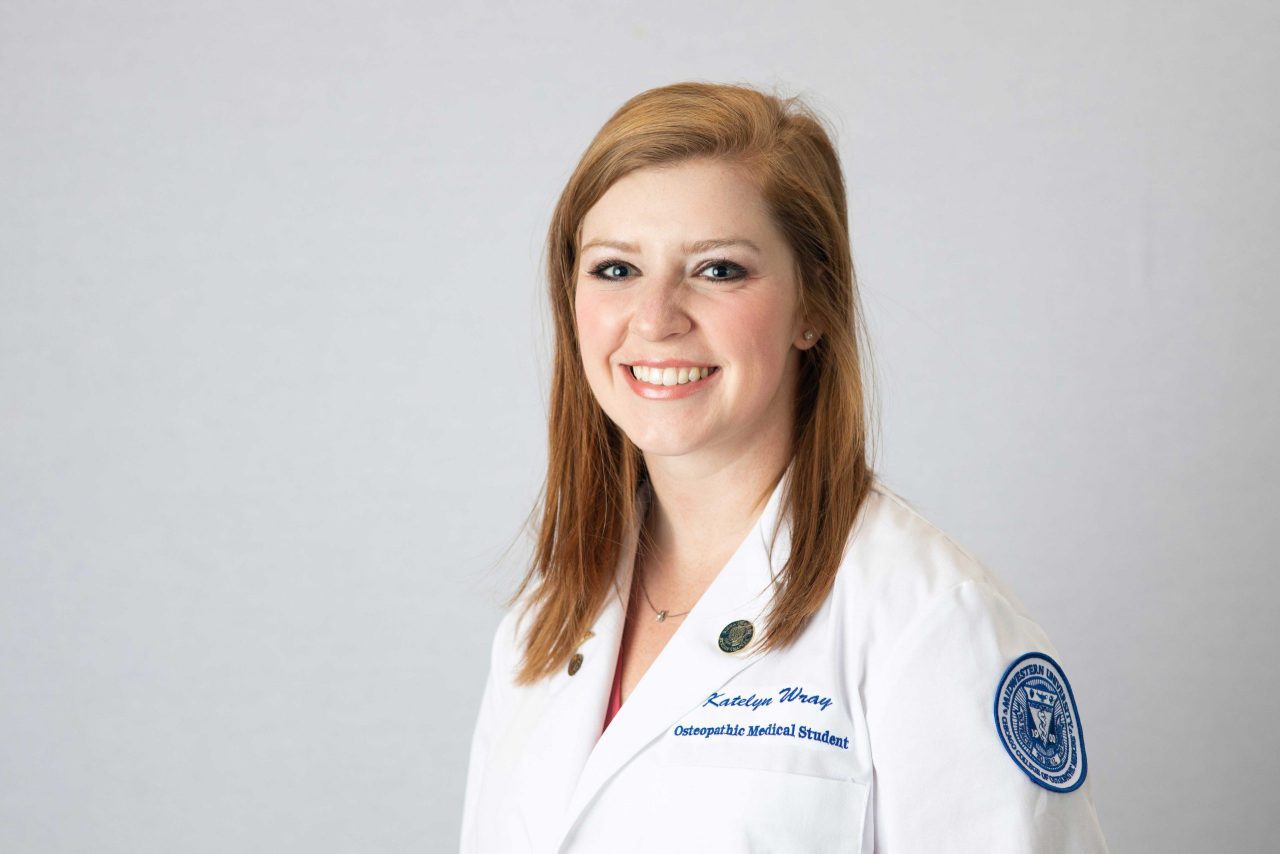“It’s important to keep in mind that we are studying for the patient, not for the exam.”
Having a balanced schedule like that is also possible for you, which is why we would like to share her experience. We’re excited to be able to relay Katelyn’s spirit, attitude, and unwavering determination to figure out how to accomplish her dream—even after not getting into medical school on her first try. It is that determination that we would like to pass on in the hopes that it will help inspire others to do the same—be confident in the pursuit of your dream, enjoy the present, and try not to stress as much we know you do. We are all human and no one is perfect.
Katelyn’s schedule won’t work for everyone either—in truth, it may only work for Katelyn. However, we hope that it may help you craft your own study schedule—one that is focused on the importance of your own wellness and mental health.
I wish I could start this off with an exciting story from my medical school life. I envisioned telling you a breathtaking encounter resembling a TV sitcom about how this past week I performed a lifesaving resuscitation in the emergency room or researched a rare syndrome, making a diagnosis no one had been able to make before. But the reality of medical school is that it’s extremely mundane. My days are long, filled with lots of exams and studying, and most recently, saturated with preparation for COMLEX-USA.
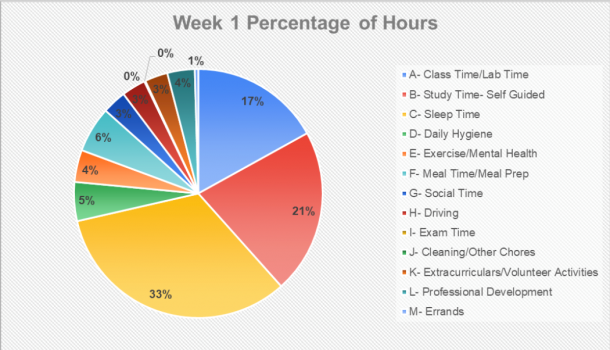
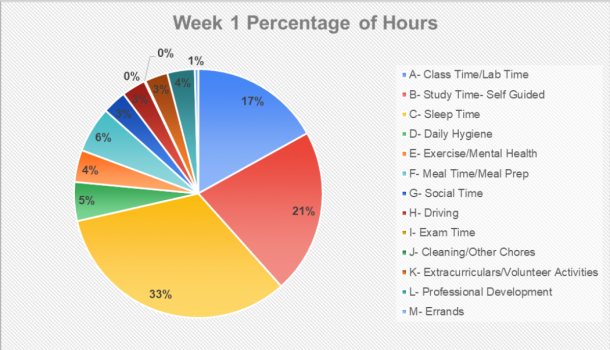
For me, a typical day starts at 5:15 AM. I live with two other second-year medical students. One of them gets up with me each morning, we get ready, eat breakfast, and head to the library together. I’m currently preparing to take COMLEX-USA Level 1 at the end of May 2020. In the mornings, I study for two to three hours: practice questions, watching review videos. I had been completing sets of 5-10 questions periodically prior to winter break, however, my exam prep has really increased since returning to school in 2020.
I attend class in person versus watching a recording of my classes. I feel that just watching recordings could isolate me, plus, attending class lets me work on my interpersonal skills and ask questions live. Because of that, my school day usually starts at 8 or 9 AM. Our curriculum has a lot of repetition, which has been very helpful to me in learning concepts and retaining them. For instance, we’ll learn a concept in anatomy during first-year, then during the clinical skills course in second-year, we’ll have the same concept presented in another way. This is different than a systems-based curriculum, which many schools utilize. This approach covers everything related to, say, the kidney, including the anatomy, pathology, pharmacology, and clinical correlations, and then moves on to the next system. For me, the repetition I get from our curricular approach has been very useful and works well with how I learn.

A typical day for me consists of about five hours of class and lab time. After that, I usually take a break. Sometimes I work out, I eat dinner, and I recharge. Then, I study my course content. Our curriculum is ‘exam heavy’ so we have about 1-2 exams per week and 2 quizzes per week.
The upside is that it holds you accountable for knowing the material and puts less value to each point. The downside is that there is always an exam to prepare for.
My day ends at 10 PM when I go to bed and get ready to do it all again.
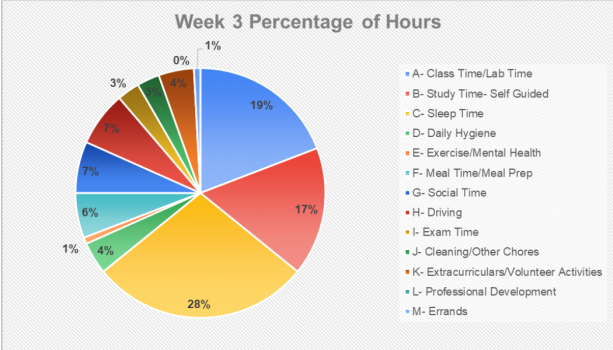
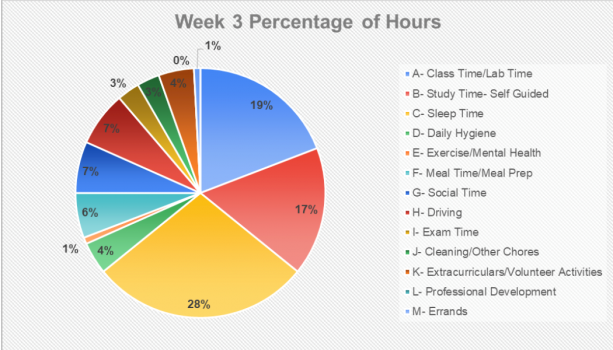
One of the most interesting parts of med school has been watching all the different ways that students can successfully DO medical school. For instance, I wake up early, study, and attend class. My other roommate sleeps in, watches lectures online, and stays up late studying. Some students study lecture packets, some use online flashcards, others utilize board prep materials, copiously annotating in the margins. During my first year, and honestly to this day, it was extremely difficult to feel comfortable and confident in my own approach to studying. This seems to be a common theme amongst my classmates. It’s so easy to doubt yourself when you see someone else successfully employ a totally different study strategy. And in a world with an overabundance of resources and information, you can find yourself burdened with the desire to study everything and learn everything all at once. At the end of the day, time is limited, so pick a study method and make the most of it—quality of studying over quantity.
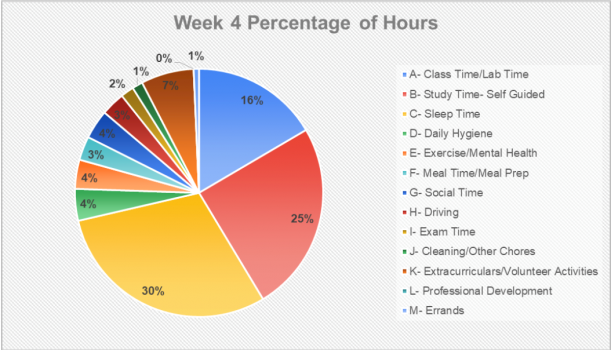
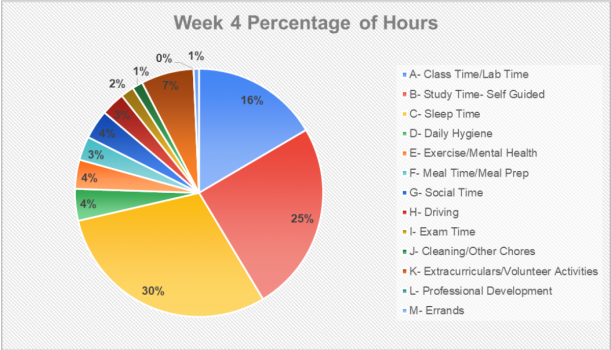
Despite the repetitive nature of my days, each day is filled with learning that brings me one day closer to fulfilling my dream. I’ve had the opportunity to volunteer at a Community Health Clinic throughout med school, and as I’ve progressed, it’s been exciting and rewarding to witness my medical knowledge grow and expand, which has increased my ability to provide quality patient care. I’m currently in the process of selecting rotation sites for my third and fourth year, and experiences like these are what bring the patients on the pages of textbooks to life and bring excitement and passion to my more mundane days. These experiences allow me to refocus and direct my energy toward studying while enabling me to eventually achieve my dream.

